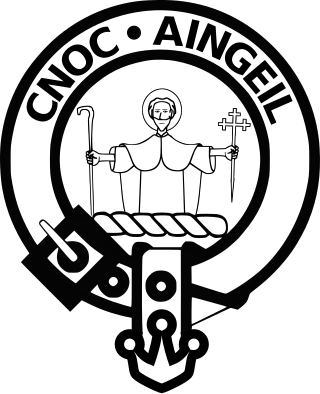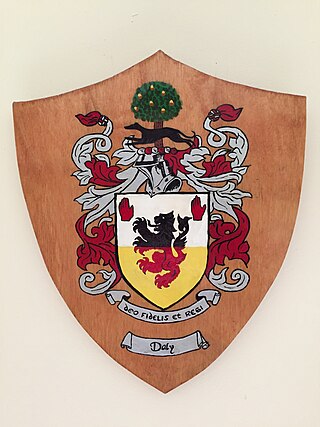Related Research Articles
This article concerns the Gaelic nobility of Ireland from ancient to modern times. It only partly overlaps with Chiefs of the Name because it excludes Scotland and other discussion. It is one of three groups of Irish nobility, the others being those nobles descended from the Hiberno-Normans and those granted titles of nobility in the Peerage of Ireland.

The O'Donnell dynasty were the dominant Irish clan of the kingdom of Tyrconnell, Ulster, in medieval Ireland.

Livingstone is a surname and given name. The surname is toponymic. It is one of the habitual surnames eventually adopted by members of the Scottish branch of the Irish Dunleavy /MacNulty royals, including the ancestors of the African missionary doctor and African explorer David Livingstone. There may be a relationship between the Livingstones and Clan MacLea.
Brian Luighneach Ua Conchobhair was a Prince of Connacht.

The Clan MacLea is a Highland Scottish clan, which was traditionally located in the district of Lorn in Argyll, Scotland, and is seated on the Isle of Lismore. There is a tradition of some MacLeas Anglicising their names to Livingstone, thus the Clan Livingstone Society's website also refers to the clan as the Highland Livingstones. The current chief of Clan MacLea was recognised by Lord Lyon as the "Coarb of Saint Moluag" and the "Hereditable Keeper of the Great Staff of Saint Moluag."
Gillebríghde Albanach was a medieval Scottish poet and crusader. He took part, along with his fellow-Gael Muireadhach Albanach, in the Fifth Crusade, reaching Acre in 1218 or 1219, and following the main Crusader army via southern Cyprus to Damietta; He may have been on crusade until 1224 or after.

The Ó Dálaigh were a learned Irish bardic family who first came to prominence early in the 12th century, when Cú Connacht Ó Dálaigh was described as "The first Ollamh of poetry in all Ireland".
McNulty is an Irish surname. It is derived from the Gaelic Mac an Ultaigh meaning "son of the Ulsterman". Usually considered a branch of the Ulaid ruling dynasty of Mac Duinnshléibhe (MacDonlevy), a branch of Dál Fiatach, who fled Ulaid to Ailech after the former's conquest in 1177 by the Normans. DNA analysis points to descent from other Ulaid families as well. After the Battle of Kinsale in 1602, some McDonlevys and McNultys migrated to the province of Connacht where their name is now also common.

Cullahill or Cullohill is a small village situated on the R639 road in County Laois, Ireland. Cullahill takes its name from an ancient forest that covered Cullahill Mountain and extended down to Cullahill Castle.
Leabhar na nGenealach is a massive genealogical collection written mainly in the years 1649 to 1650, at the college-house of St. Nicholas' Collegiate Church, Galway, by Dubhaltach MacFhirbhisigh. He continued to add material until at least 1666, five years before he was murdered in 1671. The original 17th century manuscript was bequeathed to University College Dublin (UCD), by Dublin solicitor Arthur Cox in 1929, and can be consulted in UCD Library Special Collections. The manuscript can be viewed online at Irish Script on Screen, which is available in English, and in Irish. Leabhar na nGenealach, was reprinted, and published in a five volume edition in Dublin in 2004 as The Great Book of Irish Genealogies.

Mac Amhlaoibh and Mac Amhalghaidh are two different Gaelic patronymic names with different origins and meanings, but which share the same or similar Anglicisations. These Gaelic names are borne by at least three unrelated native Irish clans or septs.
Donlevy is an Irish surname. It is derived from the Gaelic Mac Duinnshléibhe meaning 'son of Donn Sléibhe', a given name meaning 'Donn of the mountain'. It is spelled variously as McDonlevy, Donleavy and Dunleavy.

Muintir Murchada was the name of an Irish territory which derived its name from the ruling dynasty, who were in turn a branch of the Uí Briúin. The name was derived from Murchadh mac Maenach, King of Uí Briúin Seóla, who died 891.
Irish genealogy is the study of individuals and families who originated on the island of Ireland.
Donnchadh mac Eoghan Ó Duinnshléibhe was an Irish physician and the ollam leighis or official physician of the O'Donnell dynasty.
Ó Troighthigh is a Gaelic-Irish surname, meaning descendant of foot-soldier.
Risdeard Ó Conchubhair, Irish scribe and physician, 1561-18 October 1625. He was part of an Irish medical family in Gaelic Ireland.
Cormac Mac Duinnshléibhe was an Irish physician and scribe, fl. c. 1460. He was an influential medieval Irish physician and medical scholar of the Arabian school educated at universities on the Continent. He is famed for advancing Irish medieval medical practice by, for the first time, translating seminal Continental European medical texts from Latin to vernacular. His translations provided the, then, exclusively, Irish speaking and normally hereditarily apprenticed majority of Irish physicians with their first reference access to these texts.
McClay is a Scottish surname. It is derived from Gaelic Mac an Léigh, or possibly a Highland adaption of the Irish Gaelic Mac Duinnshléibhe where the Scots aspirated the “D” and then dropped the final “e” from the Irish language form of the name.
McKinley, MacKinley or Mackinlay is a Scottish and Irish surname historically associated with northwestern Ireland's County Donegal, the over-kingdom of Ulaid in northeastern Ireland and the Scottish Highlands.
References
- 1 2 3 4 "School of Celtic Studies".
- 1 2 Woulfe, Patrick (1993). Irish names and surnames. Baltimore, MD: Genealogical Publishing, Co. Inc. pp. 314–315 for Mac an Leagha entry, p. 582 for O Laoidig.
- 1 2 MacLysaght, Edward (1957). Irish Families: their names, arms, and origins. Dublin: Hodges Figgis & Co. Ltd. p. 208.
- ↑ Edward MacLysaght, The Surnames of Ireland, 5th Edition, Irish Academic Press, Dublin, 1980, pp. 238, 292, who cites two entries in The Annals of the Four Masters, which is a historical chronicle that records, among other matter, the births and deaths of Gaelic nobility. The first entry cited is an entry recording the 1395 A.D. death of a Maurice, the son of one "Paul Utach", who is, himself, recorded there to be "Chief Physician of Tyrconnell" and also as "Paul the Ulidian". It is there in the Annals further stated by its authors of the father Paul Ultach that "This is the present usual Irish name of the Mac Donlevy, who were originally chiefs of Ulidia. The branch of the family who became physicians to O'Donnell are still extant (at time of compilation of the Annals in the 17th century just after the fall of the last Gaelic sovereignty of Tyrconnell in 1607), near Kilmacrenan, in the county of Donegal." The second citation is to an entry recording the 1586 A.D. death of "Owen Utach", who is therein noted to be a particularly distinguished and skilled physician. The Annals compilers further elaborate of Owen Ultach at this entry that "His real name was Donlevy or, Mac Donlevy. He was physician to O'Donnell (Aodh Ruadh Ó Domhnaill).”